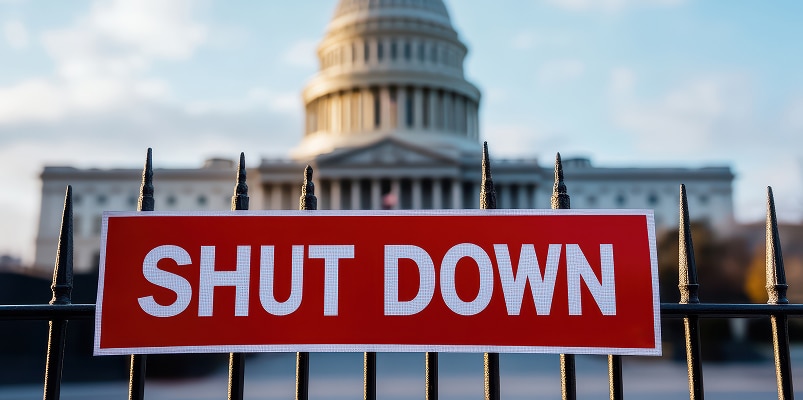If you filed an extension for your 2024 taxes, you might be worried about how the recent federal government shutdown could affect your tax return or refund. Although a shutdown may seem concerning, the good news is that the IRS is still processing e-filed tax returns. Even during a government shutdown, taxpayers who filed for an extension still need to submit their tax returns by Oct. 15, just like any other year.
Let’s go over how a government shutdown impacts the IRS and what taxpayers can expect.
What happens to the IRS during a government shutdown?
When a federal government shutdown happens, most federal agencies are required to pause nonessential operations until Congress passes a continuing resolution or spending bill to restore government funding. Employees in nonessential roles are typically furloughed, while those in essential positions continue working. This process applies to agencies across the federal government, including the Internal Revenue Service (IRS).
The 2025 federal government shutdown
During the 2025 shutdown, all IRS employees continued working for the first five business days under a contingency plan that allowed essential operations to continue temporarily thanks to supplemental funding from the Inflation Reduction Act of 2022.
However, once that initial period ended on Oct. 8, 2025, the IRS pivoted to an updated contingency plan, and furloughed approximately half of its employees. The IRS also announced that most agency operations are now closed due to the “lapse in appropriations.”
While this situation is temporary, it means certain taxpayer services, correspondence, and processing times may be delayed until funding is restored. But even as IRS operations begin to scale down, that doesn’t change the tax law — you still need to file and pay taxes as usual to avoid penalties.
What this means for you
- Tax returns for individuals, businesses, and tax-exempt organizations are still being processed.
- Most e-filed returns will continue to be processed as normal.
- The tax deadline is still Oct. 15, 2025, for individuals who filed a tax year 2024 extension to file.
- Tax refunds will continue to be issued (just make sure to choose direct deposit if possible, to avoid delays).
- Interest and penalties will continue to accrue on unpaid taxes during the shutdown.
What could be affected
The IRS has officially entered its furlough phase, temporarily shuttering many of its operations. Here’s what that means:
- Only critical public-facing services (e-filing systems, payment processing, and issuing automated tax refunds) remain active.
- Most audits and enforcement actions are paused until funding resumes.
- Live phone support, including helplines, is largely unavailable.
- Paper tax return processing and correspondence are suspended. You can still file your extended tax return on paper, but processing will be delayed.
- Tax-exempt organization applications could be delayed until the shutdown ends.
- Expect delays for any cases or responses that require direct staff involvement.
These impacts are generally temporary and should resolve once government funding is restored.
What if I owe taxes?
If you filed an extension earlier this year, you still have until Oct. 15 to file your tax return. Here’s how to stay on track:
- File electronically (you can e-file with TaxAct®) to ensure your return is processed faster. This is especially important during a government shutdown.
- Use direct deposit to avoid delays in receiving your tax refund.
- Double-check everything (including deductions and tax credits) before submitting.
- If you owe income tax, pay by the tax deadline to avoid penalties.
Even if some IRS employees are furloughed, most digital systems continue to operate automatically, allowing taxpayers to still submit, amend, or pay their tax returns. TaxAct can help you with all of these!
Contacting the IRS during a shutdown
If you need to reach the IRS during a government shutdown, keep in mind that response times may be longer than usual. Here’s what to know:
- The IRS phone lines are generally unavailable (or may have limited availability and long wait times).
- Online tools like Where’s My Refund?, transcript access, and the IRS Online Account remain available.
- Taxpayer Assistance Centers (TACs) may not be available or may operate on reduced schedules, depending on staffing and local IRS operations.
- If you received an IRS notice, make sure to still follow the instructions carefully, even if you expect a delay in response.
What this means for the regular 2025 filing season
The IRS currently expects no immediate impact on the 2025 filing season, but that could change if the federal government shutdown continues for a prolonged period. If that happens, the IRS will provide updated guidance to taxpayers and tax professionals.
Meanwhile, members of Congress, including both Democrats and Republicans, are continuing negotiations to restore government funding for the current fiscal year. If there are any important updates, we will add them to this page.
FAQs
The bottom line
A federal government shutdown can feel unsettling, but it’s still important to file your taxes on time. The tax deadline for individuals with extensions is still Oct. 15. If you haven’t filed yet, don’t wait until the last minute — submitting your tax return early can help you avoid any potential processing slowdowns and keep your tax refund on schedule.
This article is for informational purposes only and not legal or financial advice.
All TaxAct offers, products and services are subject to applicable terms and conditions.





